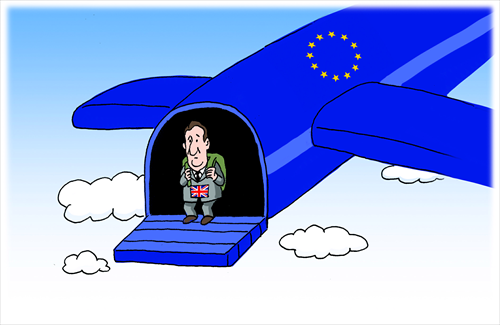HOME >> OP-ED
Upcoming Brexit referendum calls British identity into question
By Marshall Craig Source:Global Times Published: 2015-5-27 22:28:01

Illustration: Liu Rui/GT
Only months after Scotland held a vote on whether or not to remain in the UK, in this month's election a majority of English and Welsh voters chose parties promising a referendum on leaving the European Union. The truth is that the UK is struggling with its identity: The former masters of the empire "on which the sun never set" are still figuring out what it means to be an island nation. After WWII, Britain's prime minister Winston Churchill famously called for the creation of a "United States of Europe." Yet many people forget that Churchill never imagined Britain would be a part of such an EU. When Churchill discussed the postwar future of the world at the Yalta and Potsdam talks, the US, Russia, China, and Britain were the main players; in the imperial British mind-set, Britain was a world power, not one part of Europe.
Yet Britain's fall in status from empire to island after WWII meant it could not credibly maintain its position as a world power. Faced with a painful transition through the "status barrier," the British solution was to hide under the wing of the American eagle. Acting as the US's most enthusiastic ally has meant Britain could feel important on the world stage, helped by its legacy seat on the UN Security Council. The price of this policy, of course, is obedience to US foreign policy and all the consequences that entails.
Most of the discussion around British exit from the EU, or "Brexit," will center on economic consequences. These are undoubtedly important, yet, ultimately, the UK's decision is as a political not an economic one.
The UK could re-negotiate mutually acceptable trade deals with EU countries after a departure, but it would have forfeited not only its vote in how the common European market is run, but also its part in the European political community. To what extent the UK should be a part of Europe has always split governments and the country as a whole; it was the reason for the first UK-wide referendum in 1975.
However, what four decades ago could still be seen as an economic relationship is now undoubtedly a political union. This new referendum is the coming to a head of the long-standing mismatch between the explicit goal of the EU to pursue "an ever closer union among the peoples of Europe" and the UK's wish to keep its distance but benefit from free trade. This awkward relationship can be likened to one between two lovers, where one partner is only interested in physical relations while the other is looking for a life partner. After years of living together, is the UK ready for marriage, or is a separation long overdue?
There has been an inherent contradiction in the awkward see-sawing between integration and isolation that has characterized the UK's relationship with Europe to date: to join the EU but not the euro; to accept some rules but veto others. The UK's opposition to developing stronger democratic institutions in the EU has directly contributed to the situation we face now, where too much power is in the hands of "bureaucrats in Brussels," hated precisely for their unaccountability.
If the people of the UK remain determined to resist further European integration, would it not be better that they left and let the remaining nations move ahead with reform? This was precisely the sentiment behind an open letter from former French prime minister Michel Rocard telling the UK to "go before you wreck everything."
Looking at the longer span of human civilization, the period when individual European nations, and then the US, controlled the world was a historical anomaly, made possible only by the industrial revolutions in those countries. As balance returns to world politics, it is not only natural but imperative for the now relatively diminished European countries to pursue political integration. Europe must unite as one international actor if it is to negotiate on an equal footing with other major international players.
In this context, the real question facing the UK is how it will take its place at the table of nations in the future: as a member of the European community or a protectorate of the US? Lurking under the surface of this question is a deeper one: can the British lay to rest the last remnants of imperial pride and accept their place as one nation among many?
The author is a PhD candidate at the University of Oxford whose research looks at historical national identity. opinion@globaltimes.com.cn
Posted in: Viewpoint